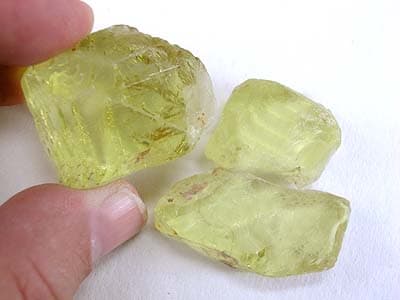Orthoclase Value, Price, and Jewelry Information
Orthoclase is best known for moonstone. It is occasionally a transparent, faceted gem.
1 Minute Read
Orthoclase is best known for moonstone. It is occasionally a transparent, faceted gem.
Start an IGS Membership today
for full access to our price guide (updated monthly).Orthoclase Value
Highest values go to adularescence, transparency, size.
Comments
Yellow and colorless catseye gems are known from Burma and Sri Lanka. Some of these (Sri Lankan) stones are also asteriated. Yellow faceted orthoclase is a handsome gemstone. Unfortunately, the cleavage makes it less advantageous for wear. Also, fine rough is hard to find, but large stones are displayed in museums.
Name
Orthoclase is from Greek words meaning break straight because the cleavages are at 90°.
Occurrence
A component of many rocks, especially alkalic and plutonic acid rocks, also granites, pegmatites, syenites.
- Many localities in the United States.
- Canada.
- Switzerland: fine crystals, known as adularia (S.G. = 2.56), from the St. Gotthard Region: the material contains some Na.
- Itrongahy Madagascar: fine, transparent yellow orthoclase in large crystals, usually with rounded faces. (Indices 1.522/1.527; birefringence 0.005; S.G. 2.56.) Faceted gems may be very large and deep in color.
- Greenland: brownish transparent crystals to more than 2 inches.
- Tvedestrand, Norway: orthoclase sunstone, deep redorange, in masses up to a few inches in size.
- Sri Lanka: in the gem gravels.
- Burma: gravels.
Stones Sizes
Madagascar produces by far the largest cuttable orthoclase known.
Smithsonian Institution (Washington, D.C): 249.6 (yellow, Madagascar); 104.5 (pale green catseye, Sri Lanka); 22.7 (white star, Sri Lanka); 6.0 (colorless, North Carolina).
UV
- Yellow orthoclase: LW and SW inert to weak reddish orange
- Semitranslucent: LW white or red
Absorption Spectrum
- Yellow Orthoclase: Broad bands at 420 and 448 nm
Variety and Trade Names
Joel E. Arem, Ph.D., FGA
Dr. Joel E. Arem has more than 60 years of experience in the world of gems and minerals. After obtaining his Ph.D. in Mineralogy from Harvard University, he has published numerous books that are still among the most widely used references and guidebooks on crystals, gems and minerals in the world.
Co-founder and President of numerous organizations, Dr. Arem has enjoyed a lifelong career in mineralogy and gemology. He has been a Smithsonian scientist and Curator, a consultant to many well-known companies and institutions, and a prolific author and speaker. Although his main activities have been as a gem cutter and dealer, his focus has always been education.
Related Articles
What is Gemstone Luminescence?
Purpurite Value, Price, and Jewelry Information
Aquamarine Value, Price, and Jewelry Information
Andradite Garnet Value, Price, and Jewelry Information
Never Stop Learning
When you join the IGS community, you get trusted diamond & gemstone information when you need it.
Get Gemology Insights
Get started with the International Gem Society’s free guide to gemstone identification. Join our weekly newsletter & get a free copy of the Gem ID Checklist!
